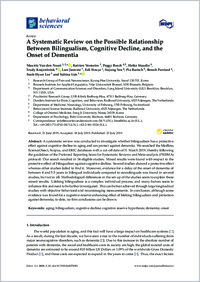A systematic review on the possible relationship between bilingualism, cognitive decline, and the onset of dementia
- Van den Noort, Maurits Research Group of Pain and Neuroscience, Kyung Hee University, Seoul, Korea - Brussels Institute for Applied Linguistics, Vrije Universiteit Brussel, Belgium
- Vermeire, Katrien Department of Communication Sciences and Disorders, Long Island University (LIU) Brooklyn, USA
- Bosch, Peggy Psychiatric Research Group, LVR-Klinik Bedburg-Hau, Germany - Donders Institute for Brain, Cognition, and Behaviour, Radboud University, Nijmegen, The Netherlands
- Staudte, Heike Psychiatric Research Group, LVR-Klinik Bedburg-Hau, Germany
- Krajenbrink, Trudy Department of Medicine, Neurology, University of Fribourg, Switzerland
- Jaswetz, Lars Behavioural Science Institute, Radboud University, Nijmegen, The Netherlands
- Struys, Esli Brussels Institute for Applied Linguistics, Vrije Universiteit Brussel, Belgium
- Yeo, Sujung College of Oriental Medicine, Sang Ji University, Wonju, Korea
- Barisch, Pia Department of Psychology, Ruhr University Bochum, Germany
- Perriard, Benoît Department of Medicine, Neurology, University of Fribourg, Switzerland
- Lee, Sook-Hyun Research Group of Pain and Neuroscience, Kyung Hee University, Seoul, Korea
- Lim, Sabina Research Group of Pain and Neuroscience, Kyung Hee University, Seoul, Korea
-
01.07.2019
Published in:
- Behavioral Sciences. - 2019, vol. 9, no. 7, p. 81
English
A systematic review was conducted to investigate whether bilingualism has a protective effect against cognitive decline in aging and can protect against dementia. We searched the Medline, ScienceDirect, Scopus, and ERIC databases with a cut-off date of 31 March 2019, thereby following the guidelines of the Preferred Reporting Items for Systematic Reviews and Meta-analysis (PRISMA) protocol. Our search resulted in 34 eligible studies. Mixed results were found with respect to the protective effect of bilingualism against cognitive decline. Several studies showed a protective effect whereas other studies failed to find it. Moreover, evidence for a delay of the onset of dementia of between 4 and 5.5 years in bilingual individuals compared to monolinguals was found in several studies, but not in all. Methodological differences in the set-up of the studies seem to explain these mixed results. Lifelong bilingualism is a complex individual process, and many factors seem to influence this and need to be further investigated. This can be best achieved through large longitudinal studies with objective behavioral and neuroimaging measurements. In conclusion, although some evidence was found for a cognitive reserve-enhancing effect of lifelong bilingualism and protection against dementia, to date, no firm conclusions can be drawn.
- Faculty
- Faculté des sciences et de médecine
- Department
- Département de Médecine
- Language
-
- English
- Classification
- Medicine
- License
-
License undefined
- Identifiers
-
- RERO DOC 327439
- DOI 10.3390/bs9070081
- Persistent URL
- https://folia.unifr.ch/unifr/documents/308268
Statistics
Document views: 145
File downloads:
- pdf: 228
